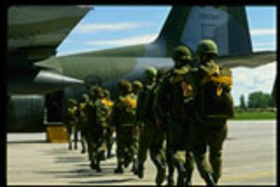Defence

- (Photo: Notat)
The so-called Petersberg-Tasks, a list of security, defence and peacemaking tasks, were taken over from the Western European Union (WEU) and inserted into the TEU under the Treaty of Amsterdam. The WEU has thus lost its importance.
The EU Rapid Reaction Force
The Petersberg-Tasks will be taken on by the EU's Rapid Reaction Force - some 60,000 personnel able to engage in combat for one year for purposes of "peacekeeping" and "peacemaking".
For these soldiers, back-up troops of about 200,000 are needed.
The Rapid Reaction Force is not a standing EU army. The EU states have guaranteed to provide the necessary forces in certain circumstances. In this it is comparable to the mutual defence commitment of NATO members.
According to the EU Treaty, UN approval (a mandate) is not required for the operations of this force (see also Petersberg-Tasks).
Notes
- Sweden and Ireland have said that they will only participate in EU military actions that have a UN mandate.
- The first EU military operation has started in March 2003 (in FYROM, former Macedonia) with a total budget of around 4.7 million Euro. This was funded from the normal EU budget.
- The first mission under the EU common foreign and security policy was a police mission in Bosnia, which started January 2003.
- The EU Defence is governed by an EU Military Committee, the EU Military Staff, and the Political and Security Committee.
The future
The EU Constitution has a special chapter on defence, Art I-40. It proposes to establish a common defence in the EU and allows the use of enhanced cooperation and structured co-operation for more demanding missions and closer cooperation for mutual defence obligations - see Art. 1-40 and 3-208.
The European Parliament only has to be informed in cases of enhanced cooperation. Finland, in particular, argued for the use of the normal enhanced cooperation rules and for constructive abstention for those not willing to take part in common military activities, but willing to permit the rest to do so.
The EU Constitution also includes a clause that commits those states that agree to be bound by a mutual defence obligation comparable to Article 5 of the NATO Treaty and the automatic mutual defence obligation in the similar Article 5 of the WEU-Treaty.
This obligation, which is sometimes referred to as an "assistance clause", raises problems for neutral countries, as well as Denmark with its special defence opt-out.
Another so-called "solidarity clause" has been inserted into the EU Constitution committing the Union to assist a Member State victim to a terrorist attack.
Links
http://european-convention.eu.int/amendemTrait.asp?lang=EN